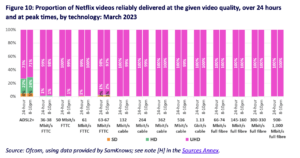
After more than 40 years of operation, DTVE is closing its doors and our website will no longer be updated daily. Thank you for all of your support.
Ofcom: UK broadband speeds on the up, video streaming becoming more reliable

Ofcom’s HQ
UK broadband speeds are continuing to rise, with upload speeds rising faster than download, according to the latest research into the performance of home broadband services by media and telecoms watchdog Ofcom.
According to Ofcom, the average download speed was 69.4 Mbps in March 2023, a 17% increase year-on-year, as people have upgraded to higher-bandwidth services, including full-fibre connections.
The proportion of lines receiving a 24-hour average download speed of at least 30 Mbps was 88% in March 2023, up from 83% in March 2022. Three per cent of connections had an average 24-hour actual download speed of less than 10 Mbps in 2023, down from 4% in 2022. Less than 1% of lines had an advertised download speed under 10 Mbps.
Ofcom found that there has been a large increase in average upload speeds, rising to 18.4 Mbps in March 2023. This was a year-on-year increase of 7.8 Mbps (73%).
The gap between urban and rural speeds has also narrowed. There was a 26% difference between average urban (70.3 Mbps) and rural (56.0 Mbps) download speeds during the 20:00-22:00 peak-time period – down from 58% in 2022.
Cable connections had the biggest increase in their average download speed, rising by 71.3 Mbps (36%) to 270.6 Mbps. The average download speed delivered by full-fibre connections increased by 1.9 Mbps (1%) year-on-year to 149.2 Mbps.
Regarding network congestion or contention, the average 20:00-22:00 peak-time download speed (67.7 Mbps) was 95% of the 71.0 Mbps average maximum speed –up from 94% in March 2022. Similarly, the average daily minimum speed (63.3 Mbps) was 89% of the average maximum speed, up from 87% in March 2022. The effect of network congestion during busy periods was lowest for full-fibre lines.
The highest median and mean average 24-hour download speeds among packages included in Ofcom’s March 2023 analysis was recorded by Virgin Media’s 1.13 Gbps cable service, at 1,137.1 Mbps and 1,123.9 Mbps respectively. T
 Regarding video streaming, Ofcom found that over a 24-hour period, 73% of Netflix videos on ADSL2+ connections were reliably delivered at UHD resolution in March 2023, up from 69% in March 2022. Twenty-two per cent of Netflix videos over ADSL2+ connections were reliably delivered in HD, with a further 4% in SD.
Regarding video streaming, Ofcom found that over a 24-hour period, 73% of Netflix videos on ADSL2+ connections were reliably delivered at UHD resolution in March 2023, up from 69% in March 2022. Twenty-two per cent of Netflix videos over ADSL2+ connections were reliably delivered in HD, with a further 4% in SD.
The regulator concluded that ADSL2+ connections may therefore be sufficient to satisfy the current broadband needs of smaller households. Netflix content was reliably streamed in UHD on nearly all superfast fibre and cable connections (those with an advertised speed of at least 30 Mbps), both over the peak-time and 24-hour period.

